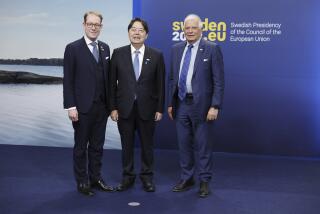Japan Is Getting the Hang of Diplomacy
- Share via
In Asia, meaningful regional cooperation is almost impossible without China. Japan recognizes this and has exhibited unusual initiative in its dealings with Beijing since the Tian An Mien Square massacre.
Japan was the first of the industrialized nations to resume loans to China and to lift other economic sanctions imposed in 1989 in reaction to the bloody crackdown against pro-democracy demonstrators. Tokyo went a step further last week, fully normalizing Sino-Japanese economic and diplomatic relations.
Japanese Prime Minister Toshiki Kaifu marked the occasion with a symbolic visit to Beijing--the first by an industrialized country’s head of state since the Tian An Mien Square tragedy. Aside from diplomatic niceties, Kaifu expressed Japan’s strongest sentiments to date--strong by Japanese standards--on Beijing’s checkered human rights record.
The prime minister urged China to facilitate closer cooperation between the two countries and regain international prestige by working “hard in the field of democratization and human rights” in a way “clear and understandable to the world community.”
Though couched in diplomatic language, that was uncharacteristically straight talk for the Japanese, who typically are wary of offending customers.
No country has moved more aggressively than Japan to take advantage of China’s market-opening measures and economic reforms. Japan is trying to move beyond its own history of hostility with China and is now Beijing’s largest foreign lender.
In the days after Tian An Mien Square, Tokyo avoided strong criticism of Beijing’s brutal actions. But during his visit, Kaifu reiterated Japan’s new foreign aid policy that links development aid to a recipient country’s record in arms trade and human rights.
He did not question aid already promised to Beijing, but Kaifu’s statement did appear to link future aid to these newly adopted principles. He even tried nudging Beijing into curbing arm sales, nuclear proliferation and human rights abuses.
Either by coincidence or design, Chinese Premier Li Peng announced during Kaifu’s visit that Beijing had agreed “in principle” to sign the Nuclear Non-Proliferation Treaty.
So it appears that Tokyo, which was roundly criticized for its checkbook diplomacy in the Gulf War, is starting to take worthwhile initiatives in its policies toward its Asian neighbors. That could be helpful to the United States. Tokyo and Washington share mutual interests in the Asia-Pacific region, and keeping China open to the world is one of them.
More to Read
Sign up for Essential California
The most important California stories and recommendations in your inbox every morning.
You may occasionally receive promotional content from the Los Angeles Times.













